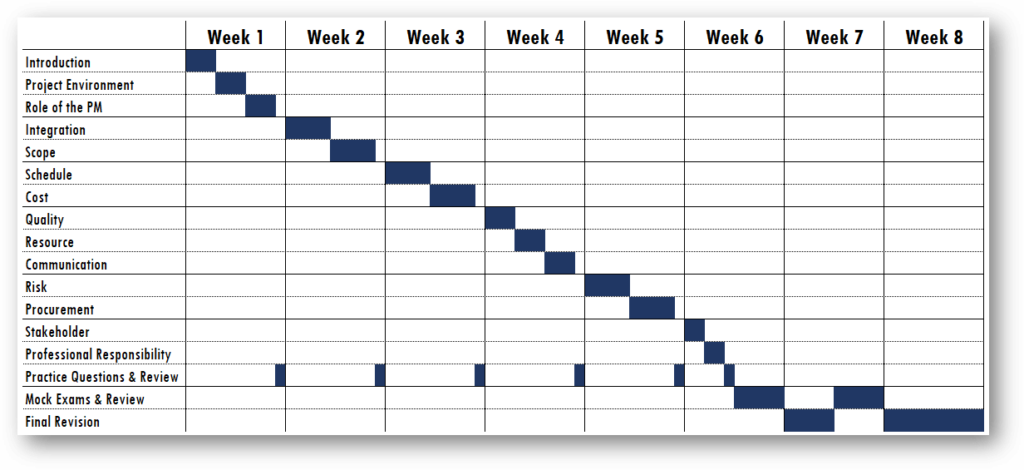DETERMINING THE APPROPRIATE PREPARATION TIME AND THE FACTORS INFLUENCING IT
One of the most frequently asked questions during our CAPM exam prep trainings is how long after the training programme you will be able to hold your credential in your hand. Of course, a lot depends on the individual needs, abilities, talents and situation of the preparer, but we will try to answer this question.

Content:
- Healthy preparation takes at least a month
- What are our chances when time is short?
- Learning vs. mastery
- In what order should you go through the materials?
- Think of preparation as a mini-project
It is safe to say that the finish is more of a marathon than a sprint, although we have seen successful examples of the latter. To prepare for the CAPM exam, you will need a total of around 45-60 hours of individual study and practice; this does not include the 23 hours of mandatory project management training exam criteria. For the high average, preparing for the exam means a continuous occupation of between 1-2 months. Of course, there are extreme cases: one of our training participants prepared in 10 days, while another took 4 months to prepare for the exam.
Healthy preparation takes at least 1 month
Once again, the timing itself can vary widely according to individual needs. A healthy pace, we believe, for a full-time candidate is 1-2 hours per day. To be more specific, let's assume that you have 1.5 hours of preparation time every evening of the week, rounded up to 11 hours per week. Assuming 45-60 hours of individual preparation, this means 4-6 weeks of preparation.
In this scenario, we have of course not taken into account that there may be major interruptions in the preparation due to holidays, business trips, long weekends, scheduling problems caused by individual schedules. It is therefore necessary for everyone to think about their own preparation possibilities and time available and plan accordingly.
What are our chances when time is short?
If you need to prepare in a sprint, investing 6 hours a day can get you ready for the exam in as little as 10 days. We would not recommend this rush to anyone, as there is little time to really understand and settle down the concepts. We encourage candidates to start using the concepts and tools in their work environment and to remember them after certification. With a 10-day rush to prepare, we see a greater chance of the latter scenario.
Regardless of how much time we have for learning and practising, we will need a preparation schedule for the period ahead. As the CAPM exam You will be asked to answer 150 computer-based test questions, and most of your preparation will be spent solving and evaluating the practice exercises. You can spend up to three quarters of your preparation time on the tests to ensure that you have the right exam routine. PMI exams have a specific logic and formulation, which can best be mastered by practising the questions tirelessly.

A possible timetable
Learning vs. mastery
Since the CAPM qualification measures lexical and theoretical knowledge - as opposed to the PMP qualification, which measures practical preparedness - there is no way around intensive learning. Of course, this does not necessarily mean memorisation, but we should be prepared to encounter a lot of things to understand. It will not always be enough to roughly remember terms, document types, tools.
The need to encourage students to study has long been a matter of debate among those who prepare for exams. We represent the school that believes that memorizing is an unnecessary and inefficient use of time. This is true if you plan to prepare within a healthy timeframe (i.e. you can devote at least a month to dedicated preparation). However, it is essential to understand the logic and ideas that link the individual elements together to answer even the driest lexical questions with confidence.
If you have to prepare for the exam in an extremely short time, memorizing is an option, maybe even a necessity, but don't expect an easy ride. Just as an example, the 49 individual project management processes may have up to 10-20 unique inputs, outputs, tools and techniques each, which should be noted in this way. And this is just a slice of a long list of items to be noted.
In what order should you go through the materials?
We will go through a number of materials, notes, tables and supplementary learning aids during the preparation period, but we have recommendations on the order in which they should be dealt with. In all cases, we recommend that candidates should start practising as soon as possible, but before doing so, they should invest energy in theoretical preparation. We recommend the following order of preparation, with the proviso that only move on from one point to the next once you have confidently learned and mastered the previous point:
- A preparation course of your choice understanding the material received, reading it through in full at least twice. In doing so, aim to:
- Try to understand the basic logic of the PMI framework.
- Try to understand and remember the purpose of different documents and tools, the possibilities and limitations of their use and their content.
- Supplement these materials with your own notes and comments, if any.
- If you get stuck somewhere, ask your trainer, the PMBOK or, if you have one, the preparation summary books (e.g. Rita Mulcahy's preparation book) for help.
- Let's study the PMBOK matrix, the interfaces and logical alignments of knowledge areas, process groups and processes; start to learn about the logic behind ITTOs, the principles of ordering.
- Learn the formulas needed, practise writing them down correctly.
- Let's review the PMI Glossary (a collection of definitions of terms used by PMI).
- Learn unfamiliar terms by looking for examples of them on the internet.
- For connoisseurs, the full Glossary can be found and learned at using the free online student card service below. In this interface, terms you already know or have learned can be ignored or skipped.
- However, we do not recommend that you learn the entire glossary, but you should be familiar with the terms you will come across and use frequently by the time you take the exam.
- Continuous practice with exercises provided by the trainer and other reliable sources . This is the most critical, most important point of our preparation.
- The theory is easy and logical, but its robustness makes it easy to confuse the easier theory.
- These exercises point out our weaknesses, so not only practising endlessly, but also evaluating the exercises is an important task.
- Always have a notebook handy to record your most important experiences and learning points.
- Continuous study of our notes and materials.
Think of preparation as a mini-project
As mentioned earlier, the most important element of preparedness is the continuous and sustained practice of the task. We dedicate at least 60% of our preparation to this. If you come across a problem where you disagree with the correct answer, feel free to ask your tutor for help. Even the highest quality question sets found online may be wrong, we may be right, or we may have misunderstood a concept and the trainer may point out our mistake, which could mean many points in the exam.
We usually suggest that if you have already completed 80% of the tasks correctly during the preparation, there is no point in preparing further, you can go for the exam (experts estimate the pass mark to be between 62-75%, but the specific value is secret and known only to PMI).
We can also consider our preparation as a mini-project. Even novice project managers know that without proper scheduling, few projects will be successful or keep within their timeframe. Try to master these basics as soon as possible and you can avoid unhealthy short preparation times and constant procrastination. When you are confident that your preparation schedule is realistic and on track, you can set a target date for the exam.

 Designabc
Designabc